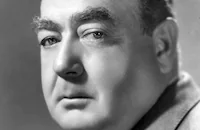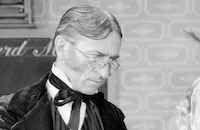Young Tom Edison

Brief Synopsis
Cast & Crew
Norman Taurog
Mickey Rooney
Fay Bainter
George Bancroft
Virginia Weidler
Eugene Pallette
Film Details
Technical Specs

Synopsis
In the early 1860's, in the town of Port Huron, Michigan, young Tom Edison is misunderstood by everyone except his mother Nancy and sister Tannie. When Tom accidentally sets off a smoke bomb in the school house cloakroom, his narrow-minded teacher, Miss Lavina Howard, calls him addled and expels him from school. Although Tom's father Samuel does not understand Tom and is disgusted with his behavior, Tom's mother retains her faith in her son. Soon after, Tom wins the gratitude of Mr. McCarney, the local telegraph operator, when he pulls his little son from the path of an oncoming train. The enterprising Tom gets a job selling concessions to passengers aboard the train, and when the Civil War starts, Tom begins to print a paper aboard the train informing passengers about the progress of the war. When Tom unwittingly carries a bottle of nitroglycerin aboard the train and sets fire to a car when one of his chemical bottles spills, he has his ears soundly boxed and is thrown off the train by Mr. Nelson, the railroad agent. Derided by the townfolk and his father, Tom plans to run away, but decides to stay when his mother falls gravely ill. In a desperate attempt to provide the needed light for an operation to save his mother's life, Tom breaks into the general store and steals a mirror to intensify the lamp light, only to be accused of theft for his ingenuity. Tom's invention helps the doctor save his mother's life, and he finally wins recognition for his heroism when he prevents a train wreck by sending a Morse code distress message on a train whistle. Tom's inventiveness wins him the admiration of the community and earns him a job as telegraph operator on the railroad. It also earns the respect of his father, who proudly tells his wife that from now on he will be known as the father of Tom Edison.

Director

Norman Taurog
Cast

Mickey Rooney

Fay Bainter

George Bancroft

Virginia Weidler

Eugene Pallette
Victor Kilian

Bobbie Jordan

J. M. Kerrigan
Lloyd Corrigan
John Kellogg

Clem Bevans

Eily Malyon
Harry Shannon
Wade Boteler
Joe Whitehead
Mickey Rentschler
Sherwood Bailey
Mitchell Lewis
Marvin Stephens
Emory Parnell
Lucky Hurlic
Art Belasco

Olin Howland
Jack Daley

Claire Mcdowell
Frances Morris
Al Thompson
John Ince
Wally Maher
John Webb Dillon
Polly Bailey
Jessie Arnold
Mitchell Ingraham
Jack Baxley
Milton Kibbee
Maude Allen
Harry Strang
Stanley Blystone

Lee Phelps
Victor Potel
Eddie Chandler
John Beck
Del Lawrence
Sam Blum
Leigh De Lacy
Bud Fine
George Magrill
Forrest Taylor
Gretchen Kimmel
Marion Sheldon
Ernie Adams
Crew
Hugo Butler
John W. Considine Jr.
Jack Dawn
Orville O. Dull
Bradbury Foote
Cedric Gibbons
Harry Mcafee
Lewis Miller
Jack Mintz
William Ryan
Dore Schary
Douglas Shearer
Gile Steele
Dolly Tree
Elmo Veron
Sidney Wagner
Edward Ward
Edwin B. Willis

Photo Collections
Film Details
Technical Specs

Articles
Young Tom Edison
MGM concocted Young Tom Edison during Hollywood's great biopic bonanza of 1939 and 1940, which poured forth a wide range of movies - from Jesse James and The Story of Alexander Graham Bell to Stanley and Livingstone and Young Mr. Lincoln - about people whose fame or infamy had made them household names. Shortly before, MGM had struck gold with the 1938 hit Boys Town, starring Rooney as a troubled youngster and Spencer Tracy as Father Edward Flanagan, the celebrated orphanage reformer. So popular was the movie that producer John W. Considine, Jr. parlayed its success into a green light for one of his pet projects, an innovative set of Edison biopics starring Rooney as the boy and Tracy as the man. Considine called in two Boys Town veterans, director Norman Taurog and co-writer Dore Schary, and set to work. The first picture completed and released was Young Tom Edison, which focuses on the inventor's life as a 16-year-old in Port Huron, Michigan, beginning shortly before the outbreak of the Civil War and ending with the lad's departure for Detroit, a big city that will better understand his brilliance, dreaminess, and eccentricity. The movie concludes with a teaser for Edison the Man (1940), showing Tracy reverently gazing at a portrait of the chap who invented (among many other things) some of the first devices for making movies like these.
The screenplay for Young Tom Edison, written by Schary with Bradbury Foote and Hugo Butler, appears to tinker as freely with the facts of Edison's boyhood as Edison tinkered with the chemicals and gizmos in his laboratory. His teacher considers him "addled" and kicks him out of school; he sets up a chemistry lab in the baggage car of a train; he finances his experiments by printing his own newspaper; and so on, one clever scheme after another. As the reviewer for Newsweek took pains to point out, however, these particular things actually happened. Knowing this doesn't obligate us to swallow everything the movie cooks up - that young Tom almost demolished a train with a batch of homemade nitroglycerin, rescued another train by blasting a danger message on a steam whistle, dived under another train to save an infant's life, and saved his mother's life by rigging a slew of lamps and a stolen mirror into a floodlight so a surgeon could perform emergency surgery on her after dark. But considering who the hero is, these fabrications are forgivable, if not believable. "As young Tom," Rooney wrote in his memoir, "I was intrepid." That's putting it mildly.
Although he rose to fame as a child star, Rooney was 20 when Young Tom Edison reached the screen, and in his 1991 autobiography he said he received his "first grown-up Oscar® nomination" for it - a revealing mistake (his 1939 nomination was for Babes in Arms) suggesting that the Edison film wasn't very vivid in his memory. What he and the movie did receive were mostly generous reviews. Comparing the eponymous hero with characters created by Mark Twain and Booth Tarkington, the Variety reviewer called it "one of the finest biographies, from entertainment standpoint, ever filmed" and lauded Rooney for playing down his "past thespic effervescence." A more measured critic in The Commonweal said that while the movie "almost smothers Tom under sentiment, family and dramatic suspense, some of the inventor's early life does seep through." Newsweek called the film "an entertaining rather than a penetrating study" by a director with experience in "adolescent histrionics." Time put Rooney on the cover, noting that his movies had grossed a whopping $30 million for MGM the previous year and praising him for "his most sober and restrained performance to date" as young Edison, "who (like himself) began at the bottom of the American heap, (like himself) had to struggle, (like himself) won, but a boy whose main activity (unlike Mickey's) was investigating, inventing, thinking." Time was less enthusiastic about the screenplay. "One boyhood does not seem enough to hold all the tortures the film Edison undergoes," the critic opined. "If this picture has any influence on the Edison legend, the inventor of electric light will be thought of in future years as an inspired masochist."
That overstates the case, but the critics were correct about Rooney's performance, which remains nuanced and graceful even when the dialogue and directing head for fantasyland. Tom's adoring mother and persnickety father are well handled by Fay Bainter and George Bancroft, respectively, and Virginia Weidler is fine as the feisty little sister. Elsewhere in the supporting cast, Eugene Pallette is properly portly and Dickensian as a long-suffering train conductor, and Eily Malyon gives a touch of the wicked witch to Tom's priggish schoolmarm - on purpose, no doubt, since The Wizard of Oz (1939) had worked magic for MGM a few months earlier.
Young Tom Edison had a special preview in Port Huron on February 11, 1940, which would have been the 93rd birthday of "the man who numbered among his thousand-odd patents that of the stock ticker, the phonograph, the motion-picture machine, and the electric light," as Newsweek put it. Not even MGM claimed much truth value for the picture, and when the more serious Edison the Man arrived, The New York Times noted the studio's sudden insistence that the earlier film was "an attempt...merely to capture the spirit of the great figure." Watch it in that spirit and you'll have some easygoing, old-fashioned fun.
Director: Norman Taurog
Producer: John W. Considine, Jr.
Screenplay: Bradbury Foote, Dore Schary, and Hugo Butler, based on material by H. Alan Dunn
Cinematographer: Sidney Wagner
Film Editing: Elmo Veron
Art Direction: Cedric Gibbons
Music: Edward Ward
With: Mickey Rooney (Tom Edison), Fay Bainter (Mrs. Samuel Edison), George Bancroft (Samuel Edison), Virginia Weidler (Tannie Edison), Eugene Pallette (Mr. Nelson), Victor Kilian (Mr. Dingle), Bobbie Jordan (Joe Dingle), J.M. Kerrigan (Mr. McCarney), Lloyd Corrigan (Dr. Pender), John Kellogg (Bill Edison), Clem Bevans (Mr. Waddell), Eily Malyon (School Teacher), Harry Shannon (Captain Brackett).
BW-86m. Closed Captioning.
by David Sterritt

Young Tom Edison
Quotes
Trivia
Notes
According to the Variety review, M-G-M originally planned a picture that would encompass Edison's entire life, but when the studio found that it had too much material, it decided to divide the film into two parts. The second part, Edison the Man, starring Spencer Tracy, dealt with the adult Tom Edison and was also released in 1940. According to news items in Hollywood Reporter, technical advisor Lewis Miller was Edison's nephew. At the Port Huron, MI, premiere of the film, a wood-burning locomotive pulling a baggage car in which Edison worked as a boy was displayed outside the theater. In December 1940, Mickey Rooney starred in a Lux Radio Theatre version of this story. In 1963, M-G-M produced a television movie titled The Wizard of Menlo Park, which was also based on the life of Tom Edison.
















